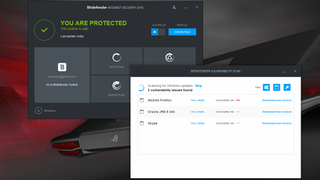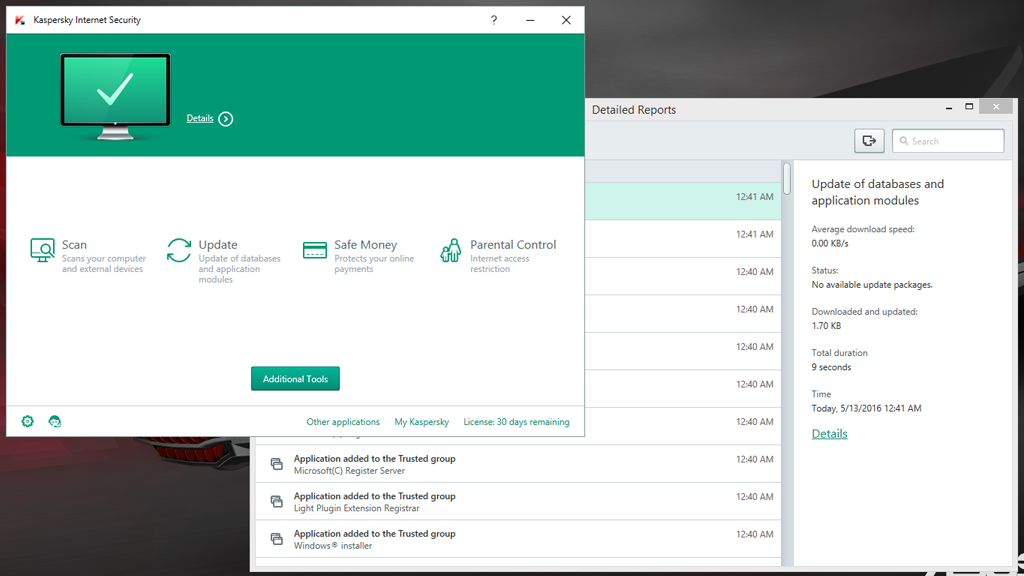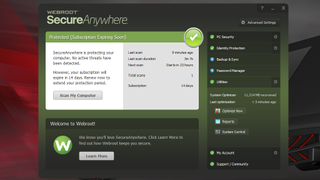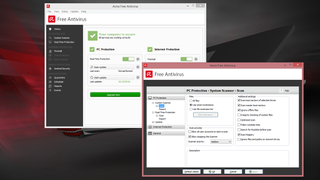Nobody wants to pay for antivirus software, particularly savvy PC users who know that the best protection
is still to practice smart computing habits. You are your best line of defense and if you avoid shady websites, use different passwords for each online account, and avoid clicking on links in email and instant messages, you might be fine to roll without protection. Then again, you might not be. The Internet is a dangerous place and even legitimate websites could inadvertently be serving up malware in the background.
The Internet is a dangerous place and even legitimate websites could inadvertently be serving up malware in the background. In some cases, your PC could be infected without any obvious signs. Usually, however, there are telltale symptoms—sluggish performance, redirected web searches, random popups, and outright extortion of your files, a form of malware on the rise known as ransomware.
Your information is valuable, not just to yourself, but also the bad guys. There’s a whole underground marketplace where stolen credit card numbers, bank login details, and other personal information is for sale. Being careful can help avoid having your data fall into the wrong hands, but being vigilant can tip the odds considerably in your favor. That’s where AV software comes in.
How much protection you need or want is up to you. The good news is there’s an assortment of options out there. As expected, the best ones cost money, though not all paid AV programs are created equal. We’ve been rounding up and evaluating security programs over the past several years and continue to monitor the landscape. Here are the ones we consider the best of the bunch.
 Best full featured security package Autopilot mode protects without nagging Tough protection against all malware Has a two-way firewall This level of protection isn't cheap
Best full featured security package Autopilot mode protects without nagging Tough protection against all malware Has a two-way firewall This level of protection isn't cheap
There are a few different options we could have picked for this category and the biggest reason we chose Bitdefender is because when it comes to AV protection, we prefer the strong and silent type. That’s Bitdefender in nutshell. Once installed, Bitdefender goes into Autopilot mode by default and makes all security related decisions for you. It won’t bother you with popups and alerts, nor does it even ask you to go through and configure its behavior. There’s no handholding here—Bitdefender is confident in its abilities to protect your system without making a fuss.
We’re confident in Bitdefender too, both because of own experience throughout the years, and because it continues to do well in independent lab tests. In AV-Test.org’s latest evaluation, Bitdefender detected every single threat, including 213 zero-day malware samples and over 20,000 widespread and prevalent malware discovered in the past four weeks. It did pick up a few false positives, but not enough to ding Bitdefender’s Usability score. And it’s passed 32 straight VB100 comparative tests by Virus Bulletin dating back to October 2010. In other words, Bitdefender rarely trips up.
If you want to take a proactive approach to security, Bitdefender can scan for vulnerabilities such as out of date software. It also checks for missing Windows updates and analyzes the strength of your Windows passwords. When it finds a third-party program that’s out of date, it gives a detailed report on the number of vulnerabilities and specific security threats it poses, and also provides a link to grab the newest version. Not many programs go the extra mile like that.
Bitdefender Internet Security isn’t overflowing with features, but the ones it includes trend more towards helpful than fluff. In addition to the vulnerability scanner, Bitdefender includes a Safepay option for conducting online transactions. Clicking on Safepay opens up a special browser based on Chromium in a sandbox environment. It adds a layer of security against outside threats, and if you want to be extra cautious, you can call up Bitdefender’s virtual keyboard to protect yourself from keyloggers.
As with most AV programs, Bitdefender has different pricing options based on the number of PCs and year of coverage your purchase. On its website, Bitdefender shows an MSRP of $80 for 1 year of protection on up to 3 PCs, though it’s often marked down 35 percent to $35.
Honorable Mention

+ Comes with handy utilities+ Additional subscription options for multiple PCs- PUP protection could be better
As much as we like Bitdefender, there are other capable security suites out there. Kaspersky Internet Security is one of them, and in this instance, we recommended paying the $10 upcharge for Kaspersky Total Security, a more fleshed out package with some handy utilities instead of just fluff.
Among the additional grab bag of goodies is a file shredder that overwrites deleted files so they’re near impossible to restore, the ability to create encrypted folders to keep sensitive files from prying eyes, password syncing among multiple devices, and PC clean-up tools, to name just a few. You can find free alternatives to all of these, but having them all in one place is convenient.
One reason we like Kaspersky because it consistently performs among the best AV programs, both in terms of identifying and blocking malware, and having a minimal impact on system performance. That’s not to say it’s perfect—we recall one particularly annoying incident where Kaspersky had let a potentially unwanted program (PUP) lock our mouse cursor in a box. It took some persistence (and Safe Mode) to fix the problem. For the most part, however, Kaspersky is very good about protecting PCs. Even on the rare occasions we’ve run into problems, they’ve been relatively minor.
Most users will find Kaspersky’s default settings adequate, but if it’s fine grain control you’re after, you’ll find plenty of it within the many submenus. There are even submenus within submenus. For example, in settings you can dive into the antivirus menu for file scanning and choose a security level (low, medium, or high), or dig even deeper by clicking on Advanced Settings to bring up more options. There are even submenus within that submenu. The downside is that it can take several clicks to dig your way to a specific setting, but it’s better than having no control at all.
Read More Best lightweight antivirus Barely uses any storage or RAM Doesn't interrupt gameplay Suprisingly well fleshed out System optimizer doesn't do much
Best lightweight antivirus Barely uses any storage or RAM Doesn't interrupt gameplay Suprisingly well fleshed out System optimizer doesn't do much
When Webroot approached us several years ago about a nimble security product that existed almost entirely in the cloud, we couldn’t help but roll our eyes. The level of hype that followed felt like a marketing schtick—here was this new AV program that was supposed to install in under 10 seconds and barely help itself to RAM or storage, yet provide adequate protection on the level of much bigger security suites. Yeah, right!, we thought. But here’s the thing, Webroot was right.
SecureAnywhere was and still is a remarkable outlier in AV. It takes up just a few megabytes of disk space and uses about 5MB of RAM when idle. During an active scan, Task Manager shows SecureAnywhere using around 50MB of RAM and less than 15 percent CPU utilization, yet takes just a couple of minutes to scan 150GB of data spread across two SSDs. It doesn’t get more lightweight than this, not unless you take your chance without any AV software.
Webroot makes a special version of SecureAnywhere for gamers. It differs from the regular version in that it offers a system optimizer tool to “analyze your devices and the operating systems to detect system issues, wipe away all traces of online activity, and make deleted files unrecoverable.” In practice, we only saw it delete temporary files to free up some disk space. SecureAnywhere also politely stays in the background so you’re not bothered by updates or added lag when playing games.
Since it’s cloud based, SecureAnywhere works best when there’s an Internet connection. In the era of ubiquitous broadband, that’s not going to be a problem for many people, particularly gamers. And though it’s lightweight and short on local storage requirements, SecureAnywhere is surprisingly high on adjustable settings. There’s well over 100 of them, and you can export your settings to make setup on another PC quick and easy.
Read More Best free antivirus: Avira Free Antivirus for Windows It's free! Customizable firewall Reliable protection Nags with ads
Best free antivirus: Avira Free Antivirus for Windows It's free! Customizable firewall Reliable protection Nags with ads
Arguing over the best free antivirus is a lot like debating beers. Some prefer a fuller bodied ale with hints of fruits and spices, while others go for a less bitter lager to quench their thirst. And so it goes in our free antivirus category in which we narrowed the choices down to Avira and BitDefender. We ultimately gave the nod to Avira, but it was close.
We chose Avira because of the level of customization available. Whether you want to duck your head into the software’s menus and start fiddling with knobs and dials is up to you, but if you do decide to tweak Avira’s behavior, you’ll find a modest toolchest of options. One setting we highly recommend enabling is to search for rootkits before scanning. It will increase scan times, but rootkits are particularly nasty in how they dig their hooks deep in the OS, so it’s better to err on the side of safety.
You can also configure how aggressively Avira scans for zero-day threats through heuristic analysis, which is set to a medium detection level by default. Cranking it up to high puts Avira in an extra cautious state, but at the risk of reporting false positives. Putting it on low has the opposite effect, or you can turn off heuristic analysis altogether, an option we don’t advise.
Avira’s scan engine isn’t the fastest on the block. However, it routinely racks up awards from independent testing labs, including AV-Test, AV-Comparatives, and Virus Bulletin. You don’t get to over 400 million downloads in the AV space unless you’re doing something right, and clearly Avira is.
What you don’t get with the free version of Avira is a Game Mode. And though Avira doesn’t cost any money, you pay for it through ads. This is where BitDefender’s free version has the advantage. In contrast, it doesn’t use ads or nag users with pop-ups, and it pauses system scans when you’re gaming. It’s a no-fuss solution, though the downside there’s not much in the way of options, just a couple of on/off switches.
Read MoreConclusionFinding the right level of AV protection is largely a personal thing. Yes, there are solutions that are better than others, but once you separate the good from the bad, it comes down to features, price, and whatever other criteria is important to you. That’s our way of saying if you don’t agree with our choices, don’t sweat it; we’re not saying your AV software stinks.
There’s also the question of whether you even need to run third-party security software. Windows Defender is free and it’s built into Windows 10. The advantage of running a security suite is that it bundles a more comprehensive solution into a tidy package. And of course the disadvantage is that they cost money. That is, unless you’re willing to piece together your collection of security software and utilities.
Finally, understand that no single AV software keeps you immune from all malware 100 percent of the time. There’s always a chance that something could slip through. No matter what you run, one thing we recommend doing is getting a second opinion from Malwarebytes. It doesn’t conflict with AV software and it can help root out foul files that have slipped past your AV scanner.
Topics
We recommend By Zergnet
Post a Comment